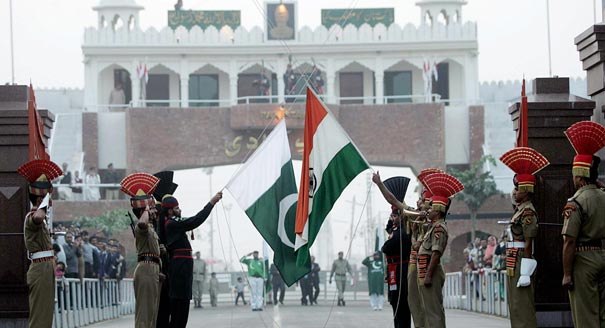{
"authors": [
"Happymon Jacob",
"Tamanna Salikuddin",
"George Perkovich"
],
"type": "event",
"centerAffiliationAll": "dc",
"centers": [
"Carnegie Endowment for International Peace"
],
"collections": [],
"englishNewsletterAll": "",
"nonEnglishNewsletterAll": "",
"primaryCenter": "Carnegie Endowment for International Peace",
"programAffiliation": "NPP",
"programs": [
"Nuclear Policy"
],
"projects": [],
"regions": [
"South Asia",
"India",
"Pakistan"
],
"topics": [
"Security",
"Military",
"Nuclear Policy",
"Foreign Policy"
]
}
Line on Fire: India-Pakistan Violence and Escalation Dynamics
Thu, May 30th, 2019
Washington, DC
Over the last decade, firing by Indian and Pakistani troops across the Line of Control in Kashmir increased dramatically, but did not escalate to general conflict. Meanwhile, the February 2019 terrorist attack in Pulwama sparked a sharp, albeit short, military confrontation between India and Pakistan that saw the first aerial combat between the two since 1971. What explains the patterns of violence along the Line of Control and what are the chances that conflict could escalate and involve nuclear weapons?
Carnegie hosted a conversation with Happymon Jacob on this question and more. In his new book Line on Fire: Ceasefire Violations and India-Pakistan Escalation Dynamics, Jacob analyzes new empirical data to examine the causes of India-Pakistan violence along the Kashmir border and the relationship with potential crisis escalation.
Happymon Jacob
Happymon Jacob is an associate professor of disarmament studies at the School of International Studies, Jawaharlal Nehru University. He is the author of the new book Line on Fire: Ceasefire Violations and India-Pakistan Escalation Dynamics.
Tamanna Salikuddin
Tamanna Salikuddin is a senior expert at the U.S. Institute of Peace, where she leads a multi-faceted program to build thought leadership and expertise on sustainable and inclusive peace processes.
George Perkovich
George Perkovich is the Ken Olivier and Angela Nomellini Chair and vice president for studies at the Carnegie Endowment for International Peace, overseeing the Technology and International Affairs Program and Nuclear Policy Program.
Carnegie does not take institutional positions on public policy issues; the views represented herein are those of the author(s) and do not necessarily reflect the views of Carnegie, its staff, or its trustees.
Event Speakers
Happymon Jacob
Happymon Jacob is an associate professor of disarmament studies at the School of International Studies of Jawaharlal Nehru University.
Tamanna Salikuddin
Former Nonresident Scholar, South Asia Program
Salikuddin was director for Afghanistan and Pakistan at the U.S. National Security Council from 2011 to 2013.
George Perkovich is the Japan Chair for a World Without Nuclear Weapons and a senior fellow in the Carnegie Endowment for International Peace’s Nuclear Policy Program. He works primarily on nuclear deterrence, nonproliferation, and disarmament issues, and is leading a study on nuclear signaling in the 21st century.
